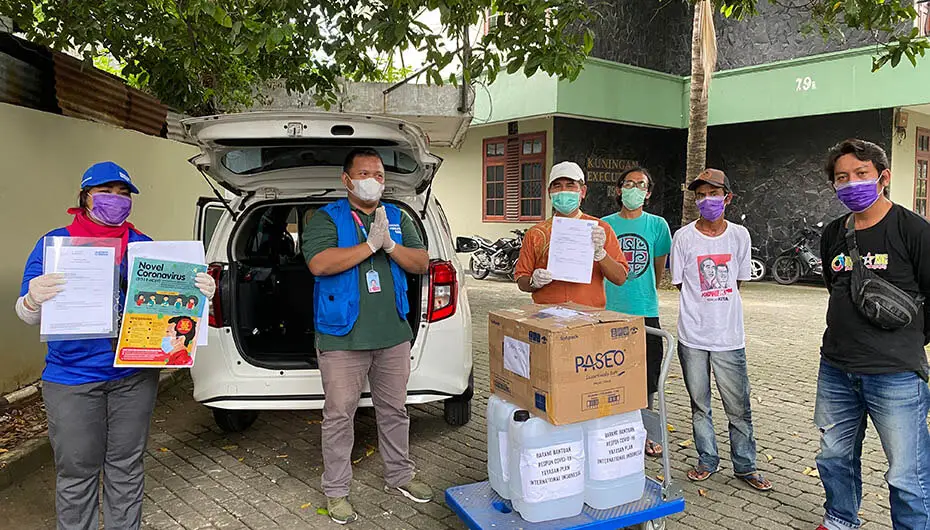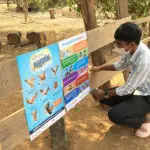Media Centre - Media release - 2 April 2020
Plan International Australia launches COVID-19 appeal, as unprecedented global code red emergency is declared

Developing nations are bracing for a major catastrophe and the loss of millions of lives, as COVID-19 cases continue to rise in poorer, highly populated and under-resourced communities.
On Monday, global aid agency Plan International Australia declared the COVID19 emergency as ‘the single greatest threat to children’s rights and equality for girls we face, in both its scale and its severity’.
The humanitarian organisation, which operates in 75 countries worldwide, has taken the unprecedented step of declaring a global red level emergency, which will involve a concerted, multi-country approach on a scale never seen before.
To support this work, an appeal has been launched requesting Australians to donate whatever they can spare to provide life-saving resources and community education in hygiene to slow the spread of COVID-19. The appeal can be accessed at here or on Facebook.
In Australia, we are fortunate to have access to excellent medical care, good nutrition and soap and clean water. But alarmingly, the WHO has reported that at least half of the world’s population could not access essential medical care even before the onset of the COVID-19 pandemic. Many of these communities – and in particular children – are already suffering from malaria, dengue fever, HIV and AIDS, tuberculosis and malnutrition.
Global health experts have warned that if we do not help poorer countries, we face the pandemic rebounding again through subsequent migration and health crises. If efforts to control COVID-19 in the developing world fail, the virus could become endemic, producing new waves of destructive outbreaks around the globe. The window to controlling COVID-19 in these communities is closing rapidly.
Plan International Australia CEO Susanne Legena said while positive signs are emerging in Australia that we are ‘flattening the curve’, achieving this in developing countries will be infinitely more challenging.
“COVID-19 affects us all. But the communities where we work abroad stand to lose the most. For so many, something as simple as accessing soap and water to wash hands is a daily challenge and physical distancing is really hard to do,” Ms Legena said.
“We have no doubt whatsoever that the COVID-19 crisis is on a path to overwhelm national health systems, badly damage economies and put millions of children at significant risk of harm. Girls, in particular, face increased threats of sexual violence, discrimination and abuse.”
Ms Legena said early reports out heavily populated countries including Bangladesh and Indonesia are cause for great concern.
“We are seeing a mass migration of now-jobless people from the cities to rural areas, which will only speed up the geographical spread of this virus. COVID-19 has also arrived in refugee camps in Greece, Syria and Bangladesh, which means the worst of our fears have come to light. These communities are so very vulnerable,” Ms Legena said.
“While we don’t yet know exactly how prevalent COVID-19 is in these places, we are absolutely certain that it has arrived. It cannot be eradicated without a vaccine, so the priority now is to slow the spread. This means getting on top of it now. The coming weeks will be absolutely crucial to saving many, many lives.
“We need Australians to help us to do this. We’re all in this together and your support to protect the world’s most vulnerable people is more important now than it ever has been. This is a truly global emergency and demands a truly global response.
“COVID-19 poses a global challenge on a scale not seen for more than 100 years. But responding to crises is what Plan International does best. I am confident that through escalating our humanitarian response we will have a significant positive impact on the lives of girls.”
Notes on Plan International’s response:
Plan International’s response to COVID-19 is focused on working with communities, governments and partners in Asia, the Pacific and Africa to:
- tackle the spread of the virus through disseminating public health information;
- promoting best hygiene practices and increasing Water Sanitation and Hygiene (WASH) programming;
- assisting communities to install hand-washing facilities; and
- ramping up our food and nutrition programs.
As the crisis unfolds Plan International will support and protect those directly affected in refugee and displaced persons camps in Bangladesh and Southern and Eastern Africa.
Child protection measures will also be stepped up to ensure that children and their families are supported and prepared to deal with the social and economic impact of this virus.
During a crisis, girls are among the most affected. When they are isolated at home they are more prone to domestic and gender based violence. Rates of child marriage often increase at these times.
Media contacts


